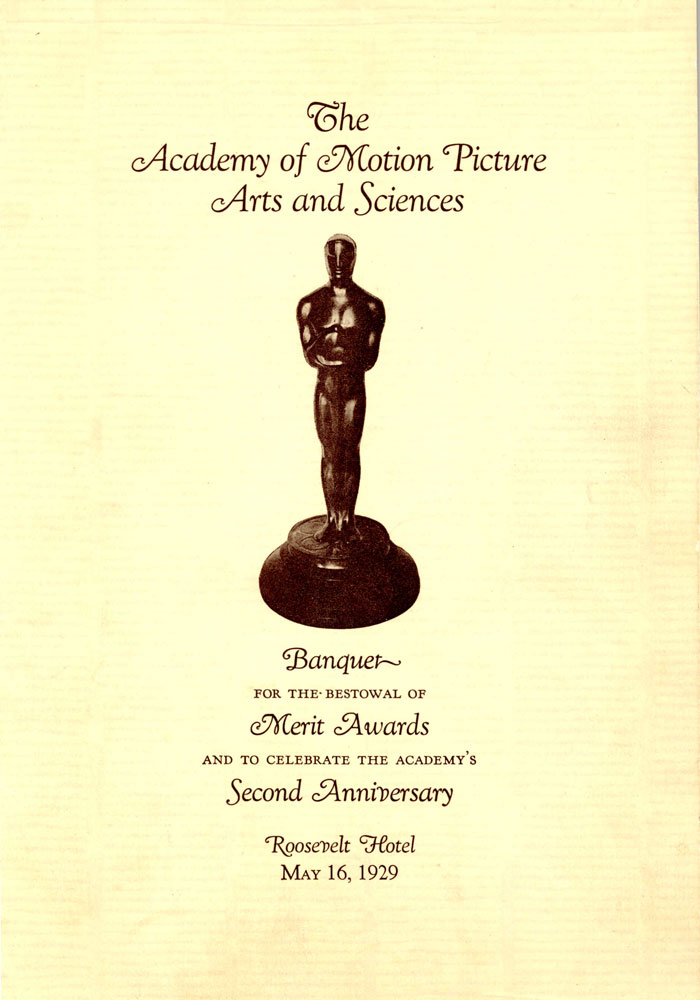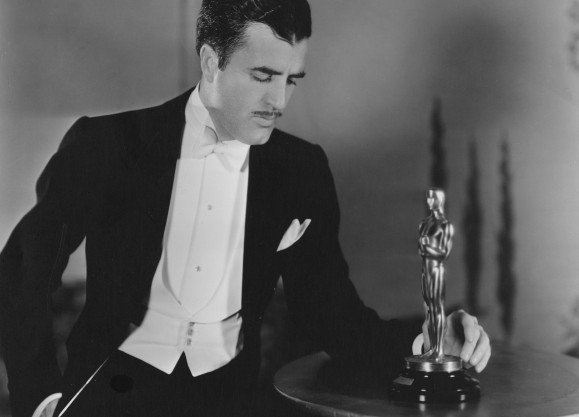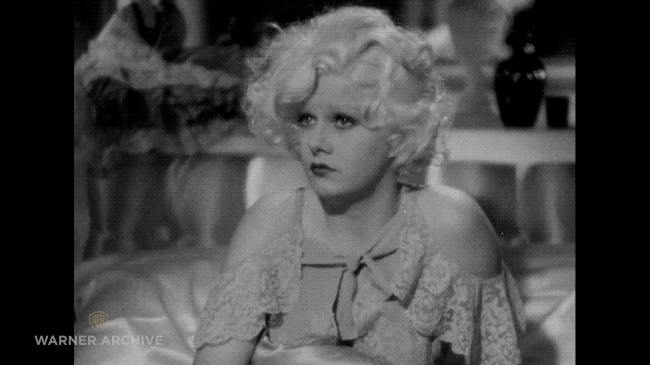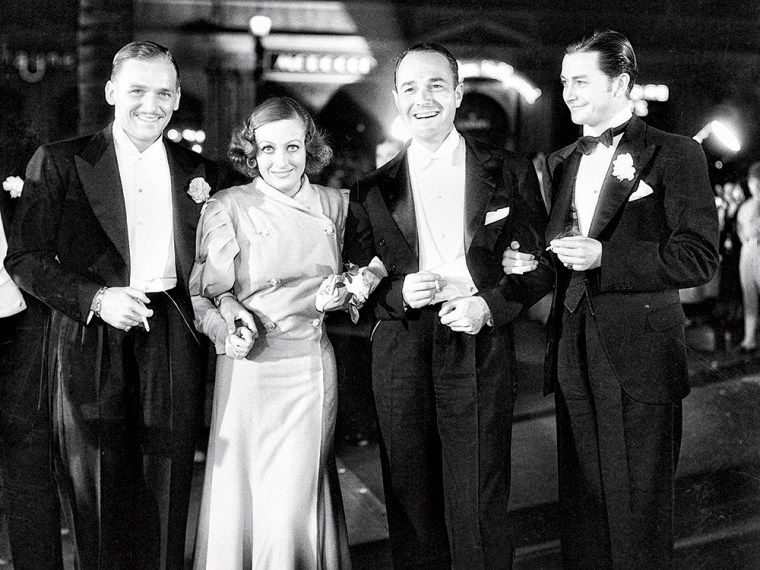No one can say for certain who gave the name “Oscar” to the Academy Awards statuette.
Bette Davis said it was she, because it reminded her of then-husband Harmon O. (Oscar) Nelson. Some say the Academy librarian, Margaret Herrick, named it after her Uncle Oscar. Hollywood columnist Sidney Skolsky says he named the statuette Oscar to “erase the phony dignity”.¹
But there is no disputing the driving force behind the Academy and its awards: MGM co-founder and producer, Louis B. Mayer.
According to the reproachful Anthony Holden, author of Behind the Oscar: The Secret History of the Academy Awards, the whole business started because Mayer wanted to build a beach house.
(Now, if you’ve been employed for any length of time, you know how it goes when your boss asks you to work on his or her personal projects. The boss thinks they can save money, while you’re burdened with an extra assignment with zero margin for error.)
Mayer asked MGM set designer, Cedric Gibbons, to design the house, and then directed his production manager to supervise construction. However! Mayer was surprised to learn studio labour would be too expensive due to the Studio Basic Agreement, signed in 1926, between the Hollywood studios and five labor unions.²
The Agreement covered employees such as carpenters and electricians, which makes for expensive beach houses. Actors, writers and directors were not protected, but Mayer realized it would only be a matter of time – and great expense.

Menu and program for the first Academy Awards ceremony. Image: Pinterest
But Mayer wasn’t the head of MGM for nothing, and in early 1927, he hosted a dinner with some influential Hollywood folk. According to Mayer’s biographer, Bosley Crowther, the question became, “Why shouldn’t there be an organization of creative elite of Hollywood…an organization which would serve as a Hollywood bureau of standard and, if need ever arose, a convenient mediator and harmonizer in any disputes involving the crafts?”³ (emphasis ours).
Membership was by Invitation Only, says Crowther, “assuring the Academy of pure cream”4, mostly producers and a few actors. Mayer himself was the Boss, and his own lawyer was involved with drafting the by-laws and constitution.5
The Academy kept the unions away because, frankly, Mayer worked hard at it. He insisted the Academy represent most studios and all important groups within those studios. So there was a branch for actors, one for directors, one for writers, etc.
As author Holden says, “For all its limitations – most notably the lack of a binding enforcement procedure for its labor codes – [the Academy] managed to forestall serious labor organizing among the Hollywood artists for five years.”6

Cedric Gibbons holds the Oscar he designed, then won in 1930. Image: Irish America
“Buried away in paragraph five, sounding very much like an afterthought,” continues Holden, “lies the birth of the most potent instrument of publicity and self-promotion any industry ever devised for itself: the Oscar.”7
The yet-to-be-named statuette was designed by MCM’s art director Cedric Gibbons during an Academy committee meeting. Gibbons, says irishamerica.com, “quickly sketched a figure of a knight holding a crusader’s sword standing atop a reel of film whose five spokes signified the five original branches of the Academy (Actors, Directors, Producers, Technicians, and Writers). The committee liked it immediately.”8
The first Academy Awards ceremony was held during a private dinner at the Hollywood Roosevelt Hotel on May 16, 1929. The 15-minute ceremony was not broadcast on the radio.
Cary Grant once summarized the cynic’s view of the awards ceremony. “There is something embarrassing about all these wealthy people publicly congratulating each other,” he said. “When it all began, we kidded ourselves and said: ‘All right, Freddie March, we know you’re making a million dollars. Now come on up and get your little medal for it.'”9
- Oscar is 13.5 inches (34.29 cm) tall and weighs 8.5 lbs (3.86 kg).
- The statuettes are made of bronze and plated with 24 kt. gold
- Surplus statuettes are kept in storage for the next year’s awards. Due to the possibility of tied votes, the Academy says it does not not know many Oscars will be handed out during a ceremony.
- According to Forbes, a pre-1950 Oscar will cost you about $1.5 million US; a newer Oscar is rarely less than $60,000 US. These are the going prices despite the agreement signed by Oscar winners, promising to first offer the statuette back to the Academy for $1.00 before releasing it on the open market.
- For more information on Louis B. Mayer click HERE.
This is part of the 31 DAYS OF OSCAR hosted by Paula’s Cinema Club, Outspoken & Freckled and Once Upon a Screen.
 Sources
Sources
¹Holden, Anthony. (1995) Behind the Oscar: The Secret History of the Academy Awards. Toronto, ON: Viking, p. 84.
²Ibid., 85
³Crowther, Bosley. (1960) Hollywood Rajah: The Life and Times of Louis B. Mayer. New York, NY: Holt, Rinehart and Winston, p. 173.
4Ibid., 174
5Holden, Behind the Oscar, 88
6Ibid., 90
7Ibid., 88-89
8Farley, Adam. (2015, May) Every Oscar is an Irish Win.
9Holden, Behind the Oscar, 93















Well, of course the Oscars would be the brain child of L.B. Mayer. He was a master at self-promotion and making money. Makes total sense. Anyway, I enjoyed your article very much.
LikeLiked by 1 person
Haha! You said it! L.B. Mayer knew how to promote things (to his advantage). Am reading a biography of Mayer right now, and am finding it hard to put down.
LikeLike
Wow!!! What a fascinating history I had no idea! (Shame on me for living in LA and not knowing that). However, I have been to the Roosevelt Hotel before and they have a big picture in there of the first “Oscar” awards 🙂 Such a great share, thanks for posting!
LikeLiked by 1 person
I LOVE the Roosevelt Hotel. A suitable place for the first Oscar ceremony, no? So much glamour and history there.
LikeLiked by 1 person
Excellent post! I knew Louis B. Mayer was the “man behind the curtain” behind the creation of the Oscars, but I certainly didn’t know that it had to do with his beach house. Very enlightening!
LikeLiked by 1 person
Yes, I was quite surprised to read that about the Beach House, but a few different sources confirmed it. It would have been something to see Mayer in action during his heyday, wouldn’t it?
LikeLiked by 1 person
This was so interesting! Thanks for linking my post, too. 🙂
LikeLiked by 1 person
I was happy to link your post because you have some good Louis B Mayer info.
LikeLiked by 1 person
Thanks, Ruth–I appreciate that!
LikeLiked by 1 person
Reblogged this on lesleybown.
LikeLike
Awards are good for business – any business.
I knew Mayer was trying to keep the Unions in line, but his beach house! The man certainly had nerve, didn’t he? I guess that’s how he got to be boss.
LikeLiked by 1 person
I just finished reading Bosley Crowther’s bio of Louis B Mayer, and LB was a true business genius. Crowther talks about his horse racing enterprise which, naturally, made a lot of money.
LikeLike
Fascinating piece about the birth of the Oscars. I love that quote from Cary Grant!
LikeLiked by 1 person
I love that Cary Grant quote, too. Puts the awards ceremony in perspective, doesn’t it?
LikeLike
It does… which often makes me wonder why, in my critical writing, I use phrases like “multiple Oscar winner” etc., in relation to a film’s qualities when I too find myself agreeing with Grant in so many ways.
LikeLiked by 1 person
Such fabulous research here, Ruth. We always get wonderful entries from you for our blogathons… thanks SO MUCH!!
LikeLiked by 1 person
Thanks so much, Kellee. I love this Blogathon, and am always excited that you three host it every year.
LikeLike
What a tasty post! My favorite takeaway is that Bosley Crowther wrote a bio of Louis B. I enjoy looking up his old reviews, and now I’ll have to get myself to the library (or Amazon) to find that book.
And like others who commented before me, I love the Roosevelt. I have a glorious memory of getting a poolside pedi there. I felt so Oscar glamorous!
Here’s my contribution to the Oscar blogathon. It’s about the night Judy Garland didn’t win an Oscar:
https://onegalsmusings.blogspot.com/2018/02/31-days-of-oscar-blogathon-controversies.html
LikeLiked by 1 person
I’m not a fan of Bosley Crowther, Movie Reviewer, but he’s a surprisingly good biographer.
You had a poolside pedi at the Roosevelt Hotel? GET OUT! That would be an utterly fabulous experience.
LikeLike
What a fascinating tidbit of film history! And I guess it goes to show that it’s possible–just possible–that the CMBA Awards will be result in a lavish gala one day.
LikeLiked by 1 person
You know it, Rick! I can’t wait until the CMBA Awards are held in the Roosevelt Hotel.
LikeLike
A wonderful insight into the origins of this, now, most prestigious and acclaimed, award ceremony in the world!!!
LikeLiked by 1 person
I suppose a cynic would say, Leave it to Hollywood to outdo itself while congratulating itself. 😉
LikeLiked by 1 person
Ha!! Ha!! True!!
LikeLike
Great post on this fascinating background, Ruth! “Humble” beginnings? “Arrogant” beginnings? It is all pretty self-congratulatory, but the business of show business is always interesting.
LikeLiked by 1 person
You said it! Show business is always fascinating.
LikeLike
Oh, that Cary! SWOON!! How interesting that all of us peons tune in every year for the elite to pat themselves on the back. Gotta love it though. Thanks for the trip down Oscar’s memory lane, Ruth. Er…um…this was loads of fun!
Aurora
LikeLiked by 1 person
Haha! Thanks for co-hosting and organizing this fun event, Aurora. It’s a highlight of the blogathon year! 🙂
LikeLike
There is always something new to learn: this bit about Louis B. Mayer is completely new to me! What a very interesting post!
LikeLiked by 1 person
If you have the chance to read Bosley Crowther’s bio of Louis B. Mayer, I recommend it. He’s actually a good biographer, as far as I can tell.
LikeLike